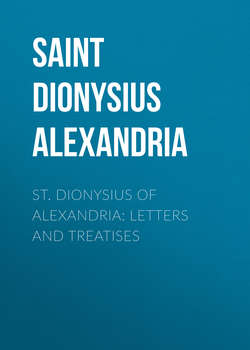St. Dionysius of Alexandria: Letters and Treatises

Реклама. ООО «ЛитРес», ИНН: 7719571260.
Оглавление
Saint Dionysius of Alexandria. St. Dionysius of Alexandria: Letters and Treatises
PREFACE
INTRODUCTION
His Family and Earlier Life
His Conversion
Was He Married or Not?
He becomes Head of the Catechetical School
He becomes Bishop of Alexandria
Under the Persecution of Decius
His Action about Heretical Baptism
Under the Persecution of Valerian
Restoration of Peace
His Return to Alexandria
The Troubles Connected with his Protest against Sabellianism
Dionysius’s Last Days
Dionysius as Author
As Christian Philosopher
General Characteristics of his Writings
Dionysius as Interpreter of Scripture
His Place in the Church Kalendar
Concluding Remarks
Bibliography
LETTERS
To Fabian, Bishop of Antioch
To Germanus a Bishop
(To Novatian)
To Cornelius, Bishop of Rome, in Reply to a Letter from him about Novatian (circ. 253)
To Stephanus, Bishop of Rome
To Xystus (or Sixtus) II80
To Philemon
To Dionysius of Rome
To Xystus (Sixtus) II, Bishop of Rome
To Conon106
From the Writings about Repentance
To Domitius and Didymus
To Hermammon
To the Brethren in Alexandria
To Hierax an Egyptian Bishop
To Basilides, Bishop of the Churches in the Pentapolis (Cyrenaica)
TREATISES
“On the Promises”
“On Nature”
“Refutation and Defence”
Additional Note to p. 12
Отрывок из книги
1. None of the many influential occupants of the see of Alexandria and of the many distinguished heads of the Catechetical School in that city seem to have been held in higher respect by the ancients than Dionysius. By common consent he is styled “the Great,” while Athanasius, one of his most famous-successors as Bishop, calls him “Teacher of the Church universal,” and Basil (of Cæsarea) refers to him as “a person of canonical authority” (κανονικός). He took a prominent and important part in all the leading movements and controversies of the day, and his opinions always carried great weight, especially in Eastern Christendom. His writings are freely referred to and quoted, not only by Eusebius the historian,1 but also by Athanasius, Basil and John of Damascus amongst others. And what we gather of his personal story from his letters and various fragments embodied in the works of others – and very little, if anything else, for certain has come down to us – undoubtedly leaves the impression that the verdict of the ancient world is correct.
2. The references to his family and early years are extremely scanty and vague. In the Chronicon Orientale, p. 94, he is stated to have been a Sabaita and sprung from “the chiefs and nobles of that race”: and several writers speak as if he had been a rhetorician before his conversion (as Cyprian of Carthage had been). The exact meaning of the term “Sabaita” above is doubtful. Strictly used, it should mean a member of the Sabaite convent near Jerusalem, and the Chronicon may be claiming Dionysius as that, though, of course, without any ground for the claim. If it is equivalent, however, to “Sabæan” here, it implies an Arab descent for him, which is hardly probable, as he seems always to consider himself connected by education and residence, if not by birth, with the city-folk of Alexandria, whom he distinguishes from the Coptic inhabitants of Egypt (Αἰγύπτιοι); so that it would be rather surprising to find that his family came from the remoter parts of Arabia, where the Sabæans dwelt. The other tradition of his having been a rhetorician may be due to some confusion between our Dionysius and a much later Alexandrian writer of the same name, who edited the works of the Areopagite with notes and wrote other treatises. On the other hand, Dionysius’s literary style is such that it might very well have been formed by the study and practice of rhetoric, while he has been thought himself to corroborate the statement of the Chronicon Orientale, as to the high position of his family, in his reply to Germanus (p. 49), where he refers to the “losses of dignities” which he has suffered for the Faith.
.....
The extracts given by Eusebius appear to be fairly continuous throughout: they deal (1) with the atomistic portion of the Epicurean philosophy, and (2) with the more strictly “theological” portion of it, the references to the hedonistic doctrine being only slight and passing.
Dionysius begins by remarking that of the various hypotheses which have been started as to the origin of the universe, one of the least satisfactory is that of Epicurus, viz. that it is the result of a chance concourse of an infinite number of atoms, as they rush through space.
.....